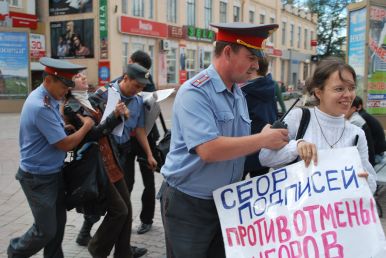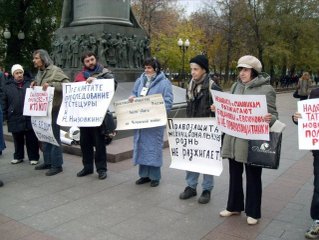On 11 January Nizovkina and Stetsura faced Sovetsky Court in Ulan-Ude. At the beginning of the hearing Stetsura and Nizovkina filed a request to call several witnesses, including experts Procurator Stupakov, who tried to prevent them from participation in the sanctioned meeting of Strategy-31 and a member of Buryatian Solidarnost Movement Maria Khankhunova. But the judge Levandovskaya dismissed all the requests.
Nizov kina and Stetsura claimed that the charges against them are directly related to the performance of legal political activity, they had started as early as in 2008 and continue to perform until the present moment. They declared that the criminals are not them but law enforcement bodies which invent cases of this kind. Nizovkina said that ‘Federal Security Service is a criminal organization and should be liquidated instead of being reformed. Ministry of the Interior and Federal Service for Execution of Punishment must be reformed’.
kina and Stetsura claimed that the charges against them are directly related to the performance of legal political activity, they had started as early as in 2008 and continue to perform until the present moment. They declared that the criminals are not them but law enforcement bodies which invent cases of this kind. Nizovkina said that ‘Federal Security Service is a criminal organization and should be liquidated instead of being reformed. Ministry of the Interior and Federal Service for Execution of Punishment must be reformed’.
The investigation accused Nizovkina and Stetsura of inciting hatred against Federal Security Service (FSB), the Ministry of the Interior, Russian Federal Penal Service (FSIN) and the Russian Army (based on Article 282 of the Criminal Code of the Russian federation). The cause for initiating the criminal case was two articles co-written by Nizovkina and Stetsura. The first article addressed the deportation of Bakhtiar Umarov, Imam of the Muslim Buryatia community to Uzbekistan. The second was about journalist Elena Maglevannaya and a leaflet commemorating the Stalin deportations of people, timed to coincide with the Defender of the Fatherland Day.
Nizovkina and Stetsura claimed they would not appeal the court decision. They also withdrew an attorney and when asked about health, reported that they ‘feel well and do not have any complaints’.
Human rights defenders of Solidarnost Movement consider criminal prosecution of Nizovkina and Stetsura a violatio n of right to freedom of expression. They fear that the case will become a precedent for the powers all over the country to view any criticism as a cause for a criminal case.
n of right to freedom of expression. They fear that the case will become a precedent for the powers all over the country to view any criticism as a cause for a criminal case.
Community pickets to support Nizovkina and Stetsura were held on 11 January in some cities of the Russian Federation. The participants demanded to stop prosecution of human rights defendants for criticism of the powers and revision of the article 282 of the Criminal Code of Russian Federation.
HRHN actions:
Participants and partner organisations of the HRHN project "Electronic Human Rights Education for Lawyers" issued two letters of concern regarding the criminal prosecution of the Russian lawyers.
Concern with detention and prosecution of Ms Nizovkina and Ms Stetsura, 17 January 2011
Regarding criminal prosecution of Nadezhda Nizovkina and Tatiana Stetsura, 8 October 2010


